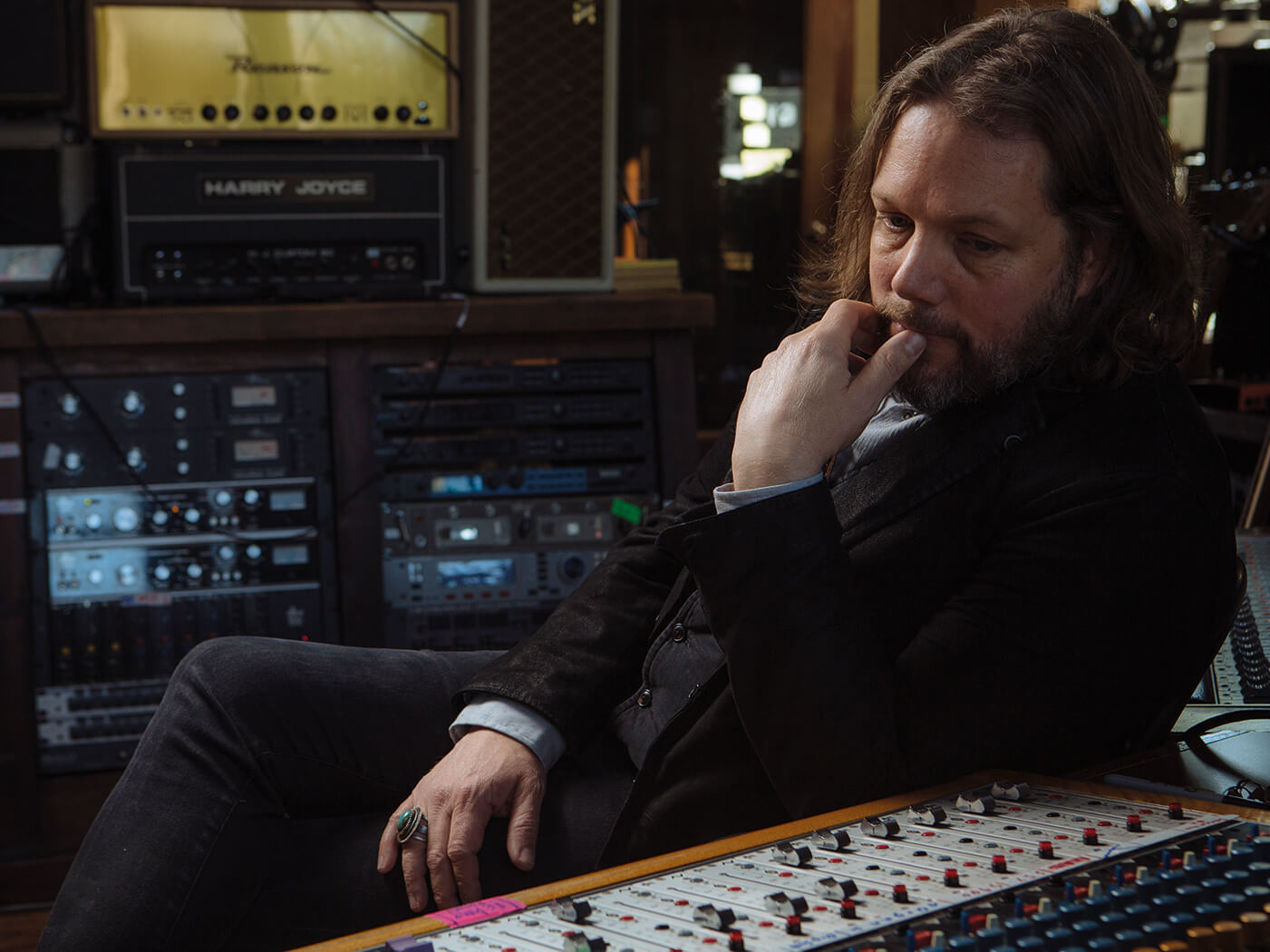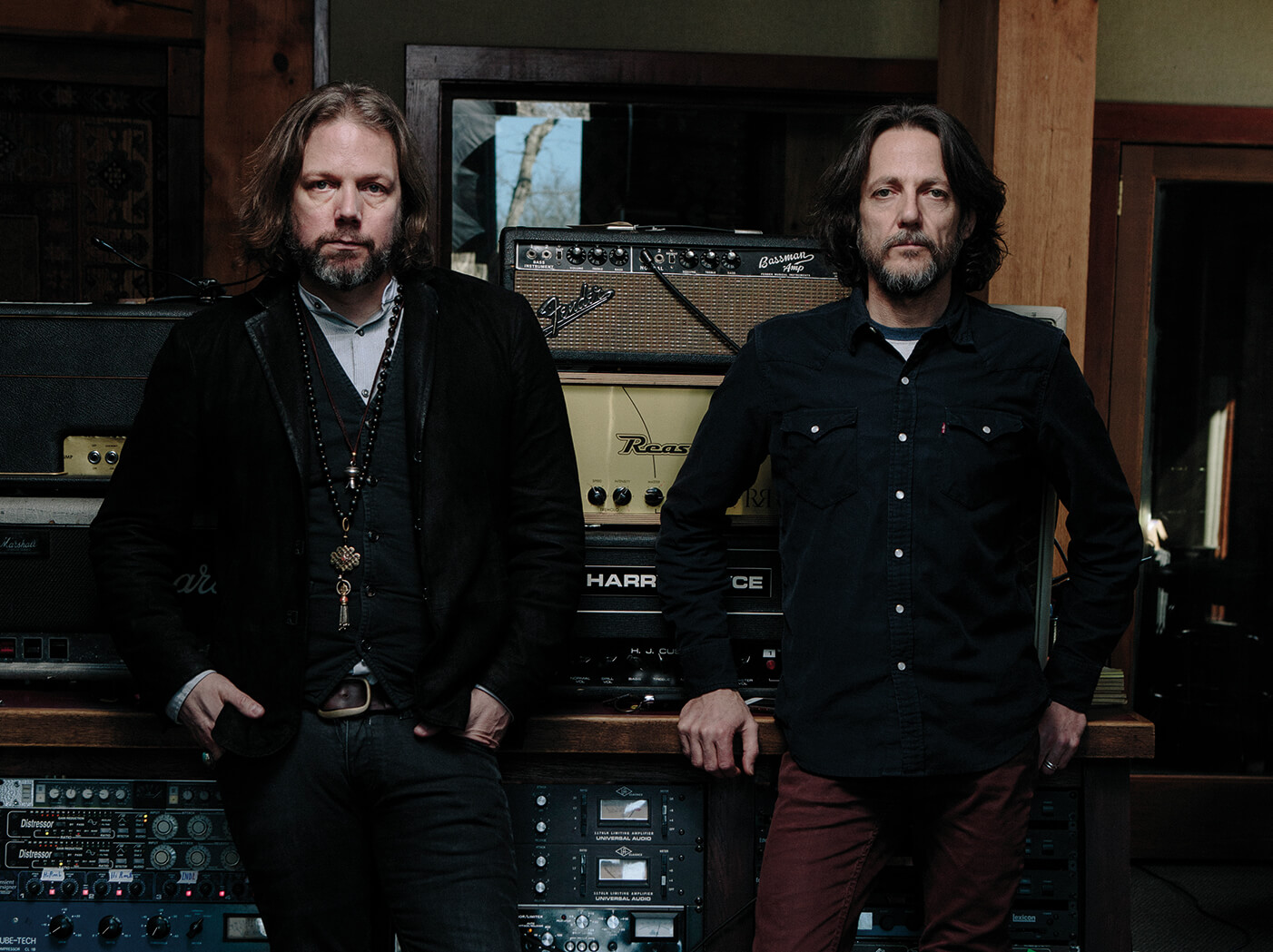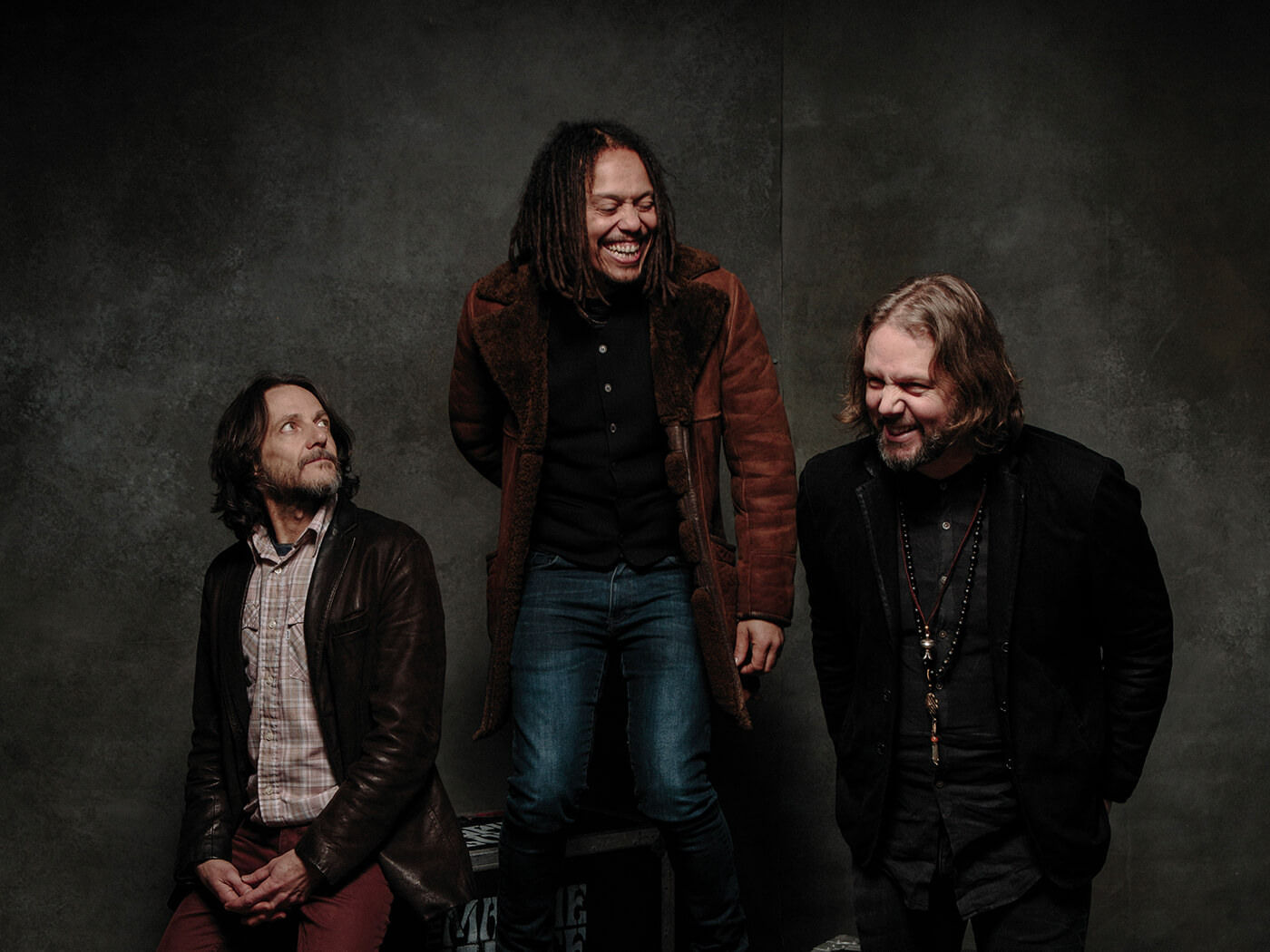Interview: Rich Robinson of The Magpie Salute, The Black Crowes
The Magpie Salute and former Black Crowes man chats about the difference between the two bands, his love of roots music, and open tunings.

Whether it’s his new band The Magpie Salute or his former one, The Black Crowes, it’s all about connectedness for Rich Robinson. For example, when the 49-year-old Georgian formed his new band in the wake of the platinum-selling rockers’ demise in 2015, he had to bring fellow ex-Crowes Marc Ford and Sven Pipien into the fold, too. The Crowes were, of course, co-founded by Robinson and brother/frontman Chris, bursting onto the scene in 1989 with rock ’n’ soul swagger, with Robinson filling the brief of rhythm guitarist and chief songwriter.
However, the band’s global success papered over some hefty personal and creative differences – primarily between the two brothers. In 2015, after eight studio albums of critically and commercially lauded Americana-vibed rock ’n’ roll, the final, acrimonious split occurred.
Introspective and considered, the younger Robinson has never courted the limelight, but music was still his passion, and so Rich quickly embarked on a solo career that saw him prove his mettle as an acoustic guitarist, but there was still rock ’n’ roll in his future.
The birth of The Magpie Salute – bluesy and often heavier than the Crowes, and yet highly-nuanced and steeped in harmonies – was something that took Robinson almost by surprise. “What I like is that it happened so organically,” he explains when we chat to him on a trip to London.
“I was touring my last solo album [The Ceaseless Sight] and an opportunity arose to play a show at Applewood Studios in Woodstock New York, where I liked to record. They invite artists to record live there with 100 people in attendance. The audience gets a glimpse into the recording process, too. As I get older I appreciate the strong musical bonds you sometimes get after many years of doing this. That happened when Marc Ford and I played together so I reached out to him and he said, ‘I don’t care what its for, I’ll be there’. So it’s kinda cool that we’re on the same page.
“I then called [keyboard player] Ed Harsch and it was like merging our pasts with the new. Just writing a setlist around that event for a three-day show I put together 76 songs from my solo stuff and the Crowes. I looked at it as a Delaney & Bonnie/Joe Cocker with Mad Dogs & Englishmen-vibe just for that weekend.”
Carrying on
But the remarkable and familiar chemistry between the three meant that almost immediately it was clear that the project would extend beyond a one-off jaunt. “I recruited singer Jon Hogg, and then I started to think about naming it,” Rich recalls. “We were always gonna be ‘cousins of Crowes’ – there’s no denying it – and I like the word ‘magpie’, because the word represents both dark and light, whereas crows tend to be dark creatures.
Also the fact that the English once saluted magpies for good fortune upon seeing them by saying, ‘Good morning, captain’, which was also the name of a Crowes song… all of those elements sealed the name for me. We did shows soon after the weekend gig and they all sold out. After the shows we solidified the band idea.”
But then, tragedy struck. “Then Eddie suddenly died,” Chris explains sadly. “His mother told me right after that he’d always wanted to play music with me again. But his desire for wanting this made us continue on from there. So we booked a tour. We put out the live show as a record (2017’s The Magpie Salute). Everyone in our band has played with me or us in the past, so it was a convergence of people and music. I wanted it to be a celebration, and it felt like it from the very beginning.”
That convergence has resulted in the band’s first full-length studio album, called High Water I (Rich tells us its follow-up will be called High Water II). “We recorded 28 songs for the debut album,” he explains. “The whole point of the new music is to focus on the songs as a band. We began writing in January: Jon, myself and Marc. I wouldn’t say it’s a concept album but it’s a common-piece both of the albums: There is the water title which denotes cleansing, rebirth.”
Getting personal
While the songs may be collaborative, from a lyrical perspective, Robinson is coming from a deeply personal place when he writes for The Magpie Salute. “Humanity is a theme, and seeking a little bit higher things than what we’re given nowadays, as it pertains to what music, art, creation is,” Rich reflects. “The world is filled with so much technology, so much of reality is mired in digital, big pharma… which blunts human emotions. But humanity needs to feel things. So these songs cover universal themes. For me as a writer I need to shoot higher than fame or money, and the need to validate people’s emotions is important.
“Just as an architect has the responsibility of not building a shitty building that will fall apart, artists, too have to answer to functionality. Songwriters create things that help humanity a bit: hopefully songs that help us feel better. That’s where we’re coming from. I feel like a tonne of people are so lost in the Western world right now. What kind of world will our kids be inheriting?”
As befits an album that came together so organically, the songwriting process was varied and collaborative when it came to creating High Water I. “There are different configurations for these songs that I wrote with Mark and Jon… or they did alone,” he explains. “Sister Moon was written by Jon and Marc. That is a keyboard-based song with lap-steel, but whenever great song that came into play, we included it. So it’s just a collection of whatever works for the band. Everyone brought something to the table. I produced it because someone had to be in charge!”
For Rich, songwriting isn’t a manufactured exercise, but rather an organic one. “I don’t believe that I can try hard to write a good song,” he insists. “For me, I just tap into the subconscious when I’m feeling it, and luckily it comes to me that way. I never sit at the piano or with a guitar to write a song if it’s not already in my consciousness. I can’t just treat songwriting like a job where I’ll spend hours writing music. I can’t write that way although I’m sure other people can get great songs that way. I have to feel inspired to write.
“I don’t question as to where it even comes from. When it does happen and it’s a great song then it’s just lightning in a bottle so I try to grab it fast. Conversely I constantly write. Even when I’m on tour, I’ll always have a guitar with me because I just feel like writing so often. But for me it always starts with a melody. I think a great song is a gift and the most important thing in all of this. You can put the best guitar solo on a shitty song and it’s still a shitty song. But a classic like Tangled Up In Blue will last forever.”
Production placement
A reluctant producer he might have been, but Rich has begun to master the subtle art of being in charge yet keeping the band vibe intact. “It’s totally a band thing,” he reiterates.
“For me, my solo albums were like finger painting because we tried whatever we wanted, me and my drummer [Joe Magistro] just playing around, but I’ve kind of fulfilled that now. I’m now wanting a bigger project and I’ve been producing for a long time with strong ideas as to idea of what it should sound like I’m comfortable saying that. I respect the band’s unique input but then I don’t like too much interference as I’ve a clear vision.”
When it comes to the guitar side, both Robinson and former Crowe Marc Ford each bring their own strengths and preferences, and again the duties are spit on a very egalitarian basis.
“It varies all over the record,” Rich acknowledges. “For songs he wrote, I’ll do solos, licks, counter-rhythm and melodies. And for songs I played and wrote he’ll do the same. Having so many people in the band [TMS has six permanent members and up to 10 in live setting] and dealing with our budget, we had to have a finite time in the studio. So I had three weeks for the band and two weeks for me and Jon to do all the vocals.
“That being said, after they all left, I changed some songs that weren’t working – I would add solos after it was all done, maybe change things a bit. One of Marc’s songs Walk On Water started in one direction, and I changed it to a more acoustic-y thing. I threw on a 12-string solo, and then I wrote to Marc telling him that I hoped he liked it. He replied with, ‘That was you? I thought it was me!’ So it was funny. So in the end it got to the point where we didn’t really know who played what. It’s only to serve the songs.”
Lost loves
In 2012, Hurricane Sandy caused huge devastation along the US east coast, and with most of his gear kept in storage in New Jersey, the hurricane also claimed many of the prized guitars that Robinson collected over the years. It’s a nightmare scenario for any guitarist, yet Robinson has managed to keep it in all in perspective.
“I lost almost everything,” he reflects. “There were dumpsters of ruined gear, except about five guitars. But there was a cleansing element to it. Guitars are made of wood and I bought more pieces of wood with strings on afterwards. So I just started over collecting and the new guitars sound like me when I play them, so I moved on.
“The one thing luckily the flood didn’t take was a 1953 D-28 that my father gave me, and with which I played on She Talks To Angels and across Shake Your Money Maker, so I love that.”
His rebuilt collection heavily on Gretsch – with both White and Black Falcons in the mix, plus a ’56 Streamliner and a Zemaitis. “On the album I also used a Dan Armstrong with a pickup that was made for me,” he adds. “Plus I’ve got a Mary Kaye Strat I use a lot, a Danelectro 12-string, this great yellow Tele I’ve had for a while, my Goldtop I’ve had forever, and one of my 335s. One was destroyed and the company who fixed it did a great job, but it wasn’t the same guitar in feel or sound anymore – it started to delaminate. But the Goldtop turned out much better than it ever sounded before the flood, and their repair ironically made it sound better than ever!
“I also have a ‘68 335 with a Bigsby on it. I’ve got the prototype – the signature one – which a master builder at Gibson made for me which is great. So I use those and I have this great SG. So I go through a lot of guitars. Everything sounds different, brings a different timbre. I use a bunch of amps too. It’s never just one thing I��’ve had my [Marshall] Silver Jubilee from Southern Harmony and Shake Your Money Maker.”
When it comes to the playing side, Robinson is a big fan of open tunings and that’s also a feature of High Water I. “Early on, I was drawn to Nick Drake,” he recalls. “One of my biggest influences besides Drake was Stephen Stills and on his solo albums he used a lot of open tunings, too. My tunings are pretty standard for this one: Open A, E, F, G and standard drop-D.”
With 30 years in the spotlight under his belt, Robinson must have picked up a fair bit of wisdom and knowledge, but his guitar-playing advice is suitably universal, philosophical and meaningful: “Ultimately, the best advice is to be sincere, don’t fake it. No one can really write for anyone else, no one has your experience, genetics, upbringing, struggles and triumphs as a human on this planet. As long as you stay sincere, just write things that mean something.”
High Water I is out now on Magpie Records.


